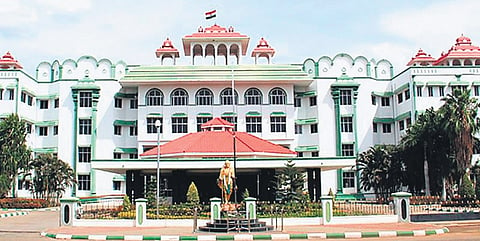

MADURAI: Observing that repeated accidents in firecracker manufacturing units denote the failure of regulatory bodies in discharging their duties, the Madurai Bench of the Madras High Court gave a series of directions and suggestions to the state government and Petroleum and Explosives Safety Organisation (PESO) on enhancement of compensation, scrutinisation of licensing practices, cause-based investigation into accidents, and structured rehabilitation framework for victims’ families, among others.
Justice B Pugalendhi gave the directions recently while enhancing the compensation awarded to four women from Rs 1 lakh to Rs 10 lakh over death of their husbands in a fire accident at a cracker manufacturing unit at Ettakkapatti village in Sivakasi in 2014.
The judge observed the accident is not an isolated case of mismanagement but is a part of a pattern of regulatory failure. The repeated pattern of accidents — 131 deaths and 146 serious injuries between 2019 and 2023 in the region — suggests a chronic absence of inspection, enforcement, and accountability.
Despite the tiered licensing mechanism, district revenue officers, who are only authorised to grant licence when the explosive substances stored or processed are below 15kg, issue licences beyond their jurisdiction by permitting multiple sheds or use of explosives above limit, the judge noted.
The Industrial Safety and Health Department, which bears statutory responsibility to oversee factory safety, is critically understaffed and the District Level Safety Committee constituted by the state labour department has not ensured meaningful oversight, he added. The criminal cases registered in connection with accidents are also investigated by police in a mechanical manner, the judge said.
The cumulative effect of all this pointed to a breach of Article 21 of the Constitution of India. Thus, the award of compensation is not penal but declaratory of the breach, and Rs 10 lakh per family is a fair, just, and proportionate recognition, the judge added and directed the state to disburse the balance amount of Rs 9 lakh to each of the four women within two months.
The judge also asked the director of industrial safety and health to ensure strict enforcement of safety norms under Explosives Act, 1884, and Factories Act, 1948, and relevant rules.
The chief controller of explosives, PESO, Nagpur, was directed to scrutinise the licensing practices in Sivakasi and other firework clusters and take appropriate action wherever licenses are found to be issued in excess of the legal limit. Further directions were issued to the DGP to ensure that investigations into cracker unit accidents are done by police personnel with technical knowledge. Whenever it is identified that the accident occurred due to the fault of the employer, the licence of the cracker unit has to be cancelled, the judge said.
“The state may evolve a structured rehabilitation framework for victims’ families, including education support for children, widow pension and housing security, so as to address the long-term impact of such industrial tragedies,” he further said.
The order was passed while allowing a batch of petitions filed by Scheduled Caste women seeking adequate compensation and government job. The women claimed that though the collector had recommended payment of Rs 5 lakh compensation to them, only Rs 1 lakh was paid.
The government counsel argued that the compensation was more than usual and three of the four petitioners had been provided jobs as anganwadi helpers. But the court said this cannot be treated as compensation for permanent loss of a breadwinner. There is no indication of group insurance, ESI coverage, or any enforceable liability fixed on the factory owners, the judge pointed out.